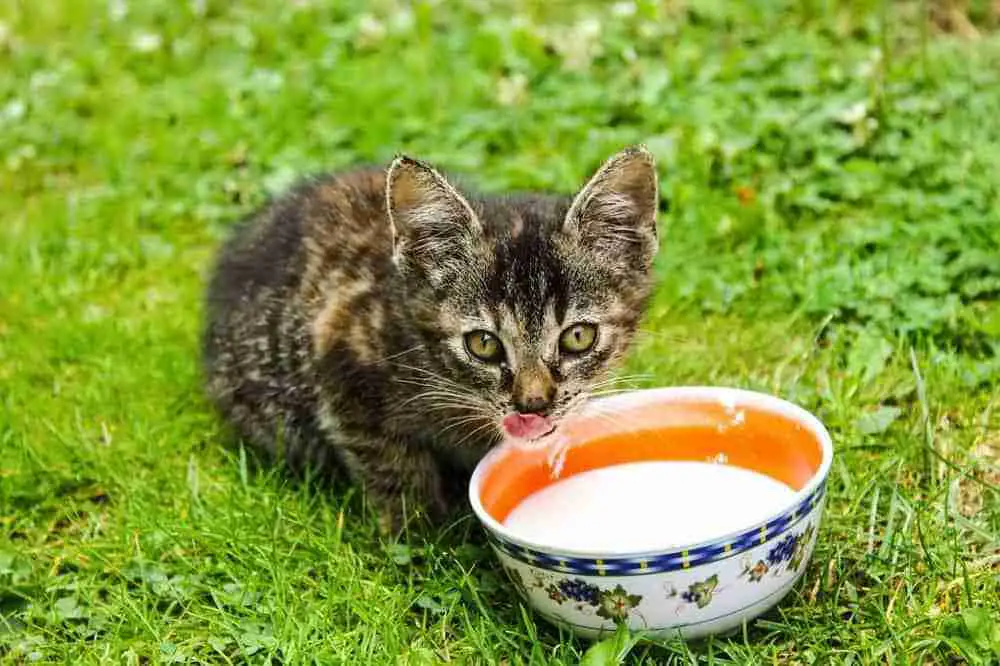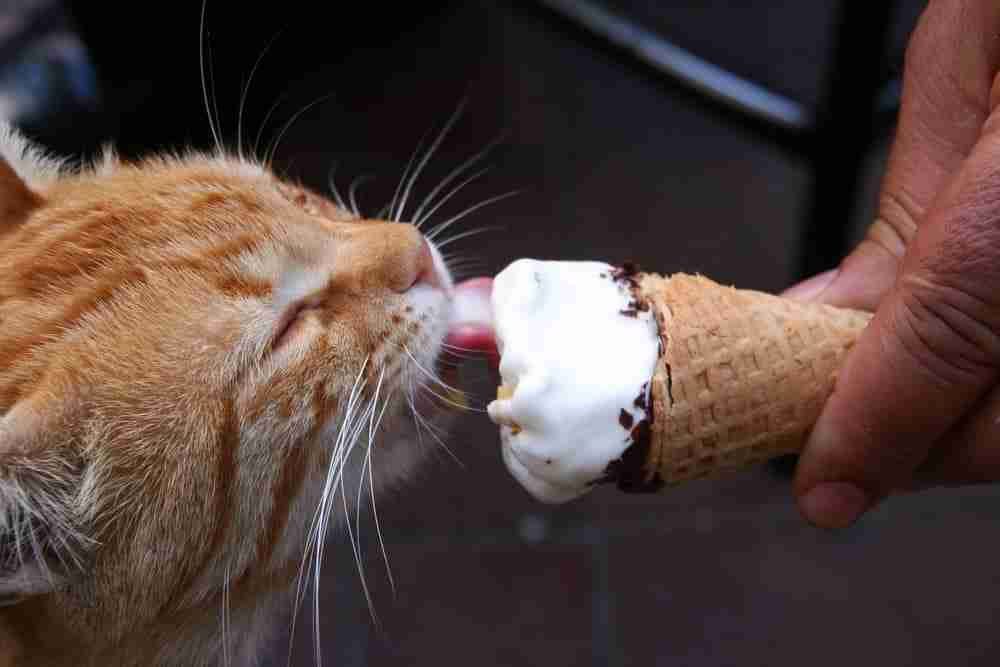Can cats eat ice cream? Is ice cream bad for cats? You shouldn’t give your cat ice cream because they are lactose intolerant, ice cream contains too much sugar and there may be traces of substances that are toxic to cats in human ice cream – however, in very small amounts ice cream won’t do any harm. Read on to learn more…
- The Myth of Cats and Drinking Milk
- Is It Bad to Feed My Cat Ice Cream?
- Why Does My Cat Seem to Like Ice Cream?
- Is My Cat Lactose Intolerant?
- What are the Nutritional Issues Involved with My Cat Eating Ice Cream?
- Can My Cat Eat Chocolate Ice Cream?
- Do I Need to Take My Cat to the Vet If they Eat Ice Cream?
- Wrapping Up – Can Cats Eat Ice Cream?
Was it a long day at the office? You turn on Netflix and crash on the couch after dinner, looking forward to the evening’s premiere. As you crack the lid on your pint of Haagen-Dazs, your cat jumps onto the sofa, nestling in your lap.
You take a spoonful of the delicious dessert, and your cat’s gaze remains transfixed on the spoon as they watch you lick away the cold, creamy goodness. Your kitty gets excited and starts meowing. Could it be that they want to try your ice cream? Can cats have ice cream?
Is it okay to feed your cat ice cream? Or is it going to harm your kitty?
The Myth of Cats and Drinking Milk
Flick through any cartoon, and you’re bound to come across a picture of Tom or Sylvester lapping on milk. In fact, if you think about a cat’s favorite food, most people would answer with fish or milk. Unfortunately, this stereotype isn’t accurate.
While cats do love fish, they shouldn’t drink milk or cream. Milk contains milk solids and lactose, and your cat doesn’t have the digestive adaptation to process these foods.
Cats evolved as “obligate carnivores.” That means that they are only suited to a meat diet. Typically, a cat’s diet consists of over 52% protein, 36% fat, and 12% carbs. Even the 36% fat content is a bit high, and most cats do better with a lower allocation to fat in their diet.
So, where did this myth start that cats enjoy drinking milk? The only stage where cats enjoy drinking milk is when they are kittens. They drink mothers’ milk for early development, weaning off the liquid after a few months.

After the kitten phase ends, the cat never returns to drinking milk. However, that doesn’t mean that your cat won’t want to drink milk. As you already know, your cat is interested in eating or drinking anything you have in front of you.
Some cat owners might not realize that their cat can’t drink milk, or they get their cat as a kitten and keep feeding it milk. Adult cats that drink a saucer of milk will end up with severe stomach discomfort.
Is It Bad to Feed My Cat Ice Cream?
So, given what we know about cats and dairy, it’s probably not a good idea to give them ice cream. Some ice cream brands have lactose-free ice cream and sorbets, but these aren’t good for your cat either.
Ice cream is a sweet dessert, and it comes with many different ingredients. Unless you’re eating fresh-made ice cream from a niche creamery, you’re getting preservatives and additives in your ice cream to extend its shelf life.
These ingredients and additives can cause health problems in your cat, and it’s best if you avoid giving them ice cream altogether.
That said, giving your cat a few licks of ice cream off your spoon probably won’t do them any harm. At this kind of quantity, the worst that could happen is your cat gets a runny tummy.

Why Does My Cat Seem to Like Ice Cream?
While we humans have a pretty average sense of smell, our cats are around 40 X better. That means when you take the lid off that Haagen-Dazs, your cat smells all the delicious milky flavors in the air. While they can’t process dairy, the smell of the cream reminds them of when they were young and drank milk.
As a result, your cat’s curiosity makes them think that since you like it and it smells good, they deserve some as well. So, if that’s the case, why does your cat keep eating the ice cream if their natural inclination is that it’s bad for them?
You might think that your cat has an attraction to the sweet taste of the ice cream, but that’s not the case. It might surprise you to learn that your cat’s tongue only has a few hundred taste buds, compared to humans that have nearly 10,000.
Your cat can’t taste sweet things because it doesn’t have the taste buds for it. However, it understands the texture, flavor, and smell of milk instinctually, and that’s attractive to your feline friend.
Is My Cat Lactose Intolerant?
Lactose intolerance is becoming more prevalent in human society as we move away from traditional farming methods. The current dairy production methods used in mass dairy farming mean that we don’t get a high-quality product like some 50-years ago.
Today’s dairy farming operations require the use of significant amounts of antibiotics to keep disease out of the herd. The cows also have a bad diet, and they receive hormones to enhance milk production. As a result, lactose intolerance is increasing in populations across the developed world.
While some humans can tolerate lactose, cats can’t stand the stuff. As mentioned, the cat evolved to be an “obligate carnivore.” That means milk is not on the menu past kitten-hood. The cat’s digestive system has the design to consume and create energy from meat and only meat.

Your cat can’t eat carbs, and it doesn’t like too much fat in its diet. Feeding her these nutrients results in digestive issues occurring in your feline friend. When cats drink milk, eat ice cream, or consume any dairy, it creates digestive distress resulting in diarrhea, vomiting, and digestive discomfort in the kitty.
It takes between two to four hours to transit your cat’s digestive system before the effects show up in your cat’s behavior, depending on how much ice cream they ate. If you notice your cat begging to go outdoors or moaning around the litter box, that’s a sign that they’re starting to feel the effects of the lactose on their gut.
What are the Nutritional Issues Involved with My Cat Eating Ice Cream?
Ice cream is heavy in dairy solids. That means it’s a significant source of unhealthy fats, some protein from the milk, and sugar from the flavorings (carbohydrates). Ice cream has little to no nutritional value for your cat.
When comparing it to their cat food, the ice cream has almost nothing that the cat needs to help them create energy. Instead, they get a whack of fat and lactose they can’t digest and sugar that makes them hyper. As a result of eating too much ice cream, cat owners find their animal starts to hang around the litter box a few hours later complaining.
If your cat eats too much ice cream, it could even result in a trip to the vet. You’ll have to keep an eye on them in the hours after their feast to see if their behavior warrants a trip to the vet’s office.
Can My Cat Eat Chocolate Ice Cream?
As mentioned, your cat can’t eat any ice cream. However, they need to avoid any chocolate flavoring specifically. Chocolate contains theobromine and caffeine, two compounds that have a lethal effect in cats at high doses.
Theobromine is an alkaloid chemical found in cocoa solids, and your cat doesn’t have the ability to process this chemical out of its system. As a result, the theobromine levels accumulate, causing symptoms of sickness that make your cat severely ill.
According to studies, as little as 100 to 200 milligrams of theobromine per kilogram of body weight is enough to kill your cat. That equates to about 7-grams of chocolate or cocoa solids being the equivalent to cause death or severe illness in your kitty after consumption.
Keep your cat away from any chocolate ice cream, no matter how much they protest. Make sure you always clean up your bowl right after finishing, as your cat is likely to lick it clean if you leave it out.

Do I Need to Take My Cat to the Vet If they Eat Ice Cream?
In most cases, no. If you give your kitty a few licks of ice cream, it’s not going to be the end of the world, and they’ll probably experience no digestive issues.
You also have to consider the temperature of the ice cream. Cats can’t stand eating anything cold; it reminds them of dead prey. Therefore, the chances are your cat will take a few curious licks and lose interest in the ice cream.
However, that behavior differs from cat to cat, and one cat might not even pay attention when you open the pint, while another won’t leave you alone.
Wrapping Up – Can Cats Eat Ice Cream?
So, wrapping up, we find that giving your cat ice cream is fine, as long as it’s only on occasion and only a small amount. Letting kitty have their way with your pint is a bad movie, and it could end up with a trip to the vet.
Still, your cat is unlikely to consume a sufficient quantity of ice cream to demand medical attention. If you come back from the bathroom to find kitty licking your ice cream bowl, don’t take them to the vet; just keep an eye on them.
Chances are, they’ll be fine, and there’s no cause for concern.
